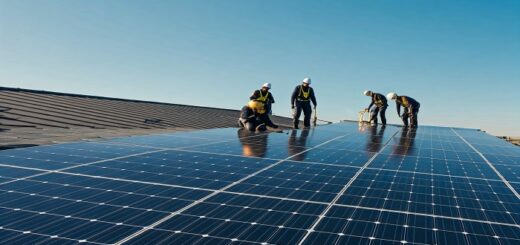Choosing the Best Solar Panel Grade for Your Budget
The sun’s power is a fantastic renewable energy source, and solar panels are the key to harnessing it for your home or business. But with so many options available, choosing the right solar panel can feel overwhelming. One factor to consider is the panel’s grade, which indicates its quality and performance. This article will guide you through the world of solar panel grading, helping you decide which panel best suits your needs and budget.
Understanding Solar Panel Grades
Solar panels are graded based on a system, typically A to D (or A, B, C), with A being the highest quality and D being the lowest. These grades reflect the panel’s appearance, power output, and overall performance. Here’s a closer look at each grade:
- Grade A: The champions of the solar panel world, Grade A panels are top-notch. They boast the highest power output, meaning they convert the most sunlight into electricity. Additionally, they have no visual defects – think of them as the flawless diamonds of the solar panel bunch. Naturally, this premium quality comes with a premium price tag.
- Grade B: These panels are still excellent choices, offering a good balance between price and performance. They might have minor cosmetic imperfections, such as slight cracks or discolorations, but these blemishes won’t significantly impact their power output. Think of them as having a tiny mark that doesn’t affect their functionality.
- Grade C: Here, you’ll find panels with more noticeable defects, such as larger cracks or discolorations. These imperfections can slightly reduce their power output compared to Grade A or B panels. However, Grade C panels can be a cost-effective option for certain applications, especially for off-grid systems where maximizing every watt isn’t crucial.
- Grade D: These panels have significant defects that can severely impact their power output. They are not recommended for most applications as their efficiency and lifespan might be considerably lower. Think of them as pre-owned cars with major issues – it is best to avoid them unless you’re a seasoned solar pro with a specific project in mind.
Important Note: It’s important to understand that there’s no universal grading standard. Different manufacturers might have their own grading criteria. Always ask for the specifics of a particular panel’s grade and how it might affect its performance.
Read More: What certifications are needed to install a Solar home system?
Choosing the Right Grade for Your Needs
So, which grade should you choose? Here are some key factors to consider:
- Budget: Grade A panels are the most expensive, while Grade C and D are more affordable. Think of it like buying a new car versus a good used one.
- Application: What are you using solar panels for? For grid-tied systems where maximizing energy production is essential, Grade A or B panels might be the best choice. However, for off-grid systems or applications where budget is a major concern, Grade C panels might be sufficient.
- Warranty: Always compare the warranties offered by different manufacturers and panel grades. A longer warranty on a slightly less efficient panel (like a Grade B) might be a better deal than a shorter warranty on a top-of-the-line panel (Grade A).
- Roof Space: This might seem unrelated, but it can play a role. Higher efficiency panels (like Grade A) can generate more power per square foot of roof space. This is important if your roof has limited space, and you need to maximize energy production.
Beyond the Grade: Other Important Factors
While grade is an important factor, it’s not the only one to consider when choosing solar panels. Here are some other key things to keep in mind:
- Panel Efficiency: This refers to the percentage of sunlight that a panel can convert into electricity. Higher efficiency panels will generate more power for your system.
- Manufacturer Reputation: Choose a reputable manufacturer with a history of producing high-quality panels.
- Temperature Coefficient: This indicates how a panel’s efficiency changes with temperature. Panels with a lower temperature coefficient will perform better in hot climates.
- Durability: Consider the warranty and how well the panel is expected to perform over its lifespan.
- Financing Options: Many solar installers offer financing options to help you make your solar project more affordable.
The Bottom Line: There’s a Perfect Panel for You!
Don’t get intimidated by all the options. By understanding solar panel grades and considering your specific needs and budget, you can choose the perfect panel for your home or business. Remember, the best panel isn’t always the most expensive one. Finding the right balance between quality, performance, and affordability is key to a successful solar project.
Navigating the Solar Panel Market: Resources and Considerations
Once you’ve grasped the concept of solar panel grades and considered your individual needs, let’s dive into some practical steps to help you navigate the solar panel market:
Researching Solar Panels:
- Manufacturer Websites: Reputable manufacturers will have detailed information about their solar panels, including specifications, performance data, warranties, and certifications. Look for information on the specific grade system they use and its implications.
- Third-Party Reviews: Websites like Energy Star and National Renewable Energy Laboratory (NREL) offer unbiased reviews and comparisons of different solar panel models. Look for reviews that specifically mention the panel’s grade and how it might affect performance.
- Industry Publications: Magazines and websites specializing in renewable energy can be valuable resources. Check out articles on best practices for selecting solar panels and reviews of different models.
Getting Quotes from Solar Installers:
- Gather Information: Before contacting installers, have a basic understanding of your roof size, sun exposure, and your estimated electricity needs. This will help installers provide you with more accurate quotes.
- Multiple Quotes: Don’t settle for the first offer you receive. Get quotes from at least 3-5 reputable solar installers in your area.
- Compare Apples to Apples: Make sure the quotes compare panels with similar grades and specifications. Focus on the total project cost, including equipment, installation, and any available incentives or rebates.
- Ask Questions: Don’t hesitate to ask installers about the specific panels they offer, their experience with different grades, and the expected output of your system.
Additional Considerations:
- Financing Options: Many solar installers offer financing solutions to help manage the upfront costs of your solar project. Explore loan options, tax credits, and other financial incentives available in your area.
- Installation Process: Ask about the installation process, including permits, timeline, and any potential disruptions to your daily routine.
- Warranties and Guarantees: Ensure you understand the warranties offered on both the panels and the installation work. Look for warranties that cover performance degradation over time.
- Remember: Choosing the right solar panel is an investment in your energy independence and environmental responsibility. Take your time, do your research, and feel confident in your decision.
The Future of Solar Panel Technology
The world of solar panels is constantly evolving. Here’s a glimpse into what the future holds:
- Increased Efficiency: Researchers are continuously developing new materials and technologies to improve panel efficiency, meaning more power generated per square foot of space.
- Lower Costs: As manufacturing processes become more efficient and economies of scale come into play, the overall cost of solar panels is expected to continue decreasing.
- Improved Aesthetics: Solar panels are already becoming more visually appealing, with options for sleek black panels and even integrated roofing solutions.
- Smarter Panels: Smart solar panels are emerging, equipped with sensors and monitoring systems that allow for real-time performance tracking and optimization.
By staying informed about the latest advancements, you can be confident that your solar panel investment will remain a wise decision for years to come.
Conclusion:
Harnessing the power of the sun for your home or business is an exciting opportunity. By understanding solar panel grades, conducting thorough research, and making informed decisions, you can choose the perfect panel for your needs and contribute to a cleaner and more sustainable future. Let the sunshine bright on your energy independence!


















